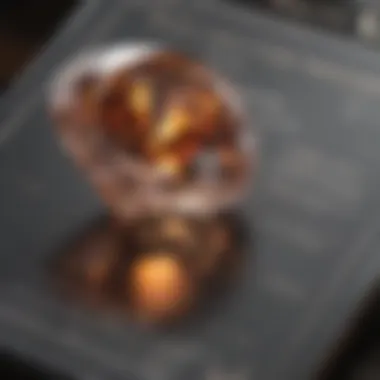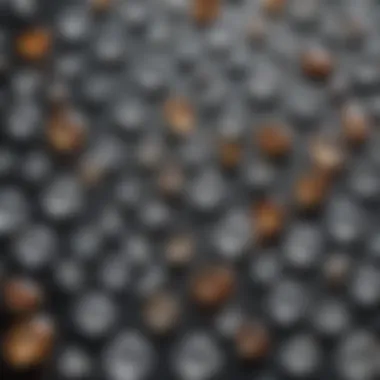Local Diamond Appraisal: A Complete Guide


Intro
When it comes to diamonds, their allure is hard to resist. Whether you’ve inherited a beloved piece or you’re contemplating a hefty investment, knowing the value of your diamond is critical. This article aims to guide you through the process of finding a local diamond appraisal service. Knowing what to look for and understanding how appraisals work can save you time and possibly a great deal of money.
As you embark on this journey, consider how a proper appraisal might affect not just the sale of your diamond but also its implications for insurance and estate planning. Grasping these concepts will allow you to navigate the often murky waters of diamond valuation with clarity.
Missing out on accurate diamond assessments is like playing a game of roulette with your assets. Accurate appraisals help you understand the true worth of your gemstone, shielding you from potential pitfalls. In the following sections, we will delve into essential aspects you must consider to make informed choices regarding local appraisal services.
Understanding Diamond Appraisals
When it comes to your precious stones, understanding diamond appraisals is crucial. It’s not just about the shine; it’s about accurately determining value for insurance, sales, or even estate planning. A diamond appraisal provides a solid foundation for negotiating prices, ensuring your investment is well-protected against potential pitfalls. Whether you’re holding onto a family heirloom or planning to make a purchase, knowing the ins and outs of diamond appraisals is absolutely vital.
What is a Diamond Appraisal?
A diamond appraisal is essentially a professional assessment that determines the value of a diamond. This service is typically carried out by certified appraisers who consider various factors that contribute to the diamond's overall worth. These factors include:
- Carat Weight: This is the size of the diamond, and larger stones often fetch higher prices.
- Color: Diamonds come in a variety of shades, from colorless to shades of yellow or brown. The more colorless the diamond, the more desirable it is, generally speaking.
- Clarity: This aspect looks at the internal and external flaws of the diamond. The lesser the inclusions, the higher the clarity grade, significantly influencing its value.
- Cut: This doesn’t refer just to the shape, but how well the diamond is cut and polished to reflect light, enhancing its brilliance.
Each of these aspects provides crucial insights into the quality and value of the diamond in question. Appraisers use this information, along with market conditions, to formulate a well-informed value estimation.
Importance of Accurate Appraisals
Accurate appraisals are not merely a luxury; they are an necessity. A precise valuation can save you headaches whether you're buying, selling, or insuring your gemstone.
- For Selling: Knowing the true worth of your diamond can prevent you from underselling yourself or demanding unrealistic prices.
- For Insurance: An accurate appraisal will help you select the right coverage for your diamond. Underinsuring can lead to financial loss if the diamond ever gets lost or damaged.
- Estate Planning: If you're dealing with inheritance, an accurate appraisal ensures that the diamond's value is correctly reflected in estate calculations, helping to prevent disputes among heirs.
The right appraisal solidifies your confidence, guiding you through the intricacies of buying or selling without getting lost in the shuffle.
Types of Diamond Appraisal Services
Finding the right kind of diamond appraisal service is crucial when valuing your precious jewels. The landscape is filled with various options, each offering unique services and advantages. Understanding these types can help you make informed decisions that align with your needs.
Professional Appraisers vs. Jewelers
When it comes to diamond appraisal, one must distinguish between professional appraisers and jewelers. Professional appraisers are individuals who specialize in valuing gems and jewelry. They often hold certifications from recognized bodies, such as the Gemological Institute of America. Their training incldes thorough knowledge in gemology, market trends, and valuation standards, ensuring an unbiased assessment based on factors like clarity, color, and cut.
On the other hand, jewelers may provide appraisal services, but their primary focus is on selling jewelry. Their expertise often leans more towards crafting and designing rather than independently assessing value. Consequently, their appraisals might be influenced by their product inventory and sales objectives. It is wise to verify the appraiser's credentials — a reputable appraiser will provide a clear, detailed report rather than just a ballpark figure.
Choosing the right evaluator can dramatically affect the perceived value of your diamond, especially if you're considering selling or insuring it.
In-Store vs. Remote Appraisals
The world has evolved, as has the appraisal process. You can choose between in-store appraisals and remote appraisals.
In-store appraisals take place in person, allowing for a thorough examination of the diamond under optimal lighting and magnification tools. This face-to-face experience enables a dialogue between you and the appraiser, enhancing the clarity of any questions or concerns. You can observe the appraisal process, feel confident in the methodology used, and understand the reasoning behind the final valuation.


Conversely, remote appraisals — increasingly popular in today's digital age — offer convenience. Using platforms like video calls, gemologists can assess the diamond virtually. However, this method relies heavily on the quality of images provided and the appraiser's experience with online evaluations. While it is handy, it might lack the in-depth analysis one can receive in person.
Ultimately, it boils down to your comfort and situation. For a deeper understanding of your diamond's nuances, an in-store appraisal may be worth the trip, while remote options can save you time without compromising too much on accuracy.
"Choosing between in-store and remote appraisals depends on your urgency and comfort level with technology. Both have their merits, but knowing what you are comfortable with is key."
In summary, understanding the types of diamond appraisal services helps navigate the appraisal landscape more effectively. You can decide better whether to go with a seasoned professional or a local jeweler and if you want to meet in person or consult remotely.
Factors to Consider When Looking for Appraisal Services
Navigating the world of diamond appraisals can feel like trying to find a needle in a haystack. Whether you’re getting ready to sell a cherished piece or simply want to know its true value, understanding the factors that come into play is paramount. Some appraisers may sing the praises of their servicess, while others might leave you feeling out in the cold. Knowing what to consider ensures the experience is smooth and dependable.
Qualifications and Certifications
When it comes to appraisals, qualifications and certifications of the appraiser aren’t just important—they’re essential. You wouldn’t let someone fix your car without knowing their professional background, right? Likewise, it’s crucial to check if your appraiser is certified by recognized institutions like the Gemological Institute of America (GIA) or the American Society of Appraisers (ASA).
A certified appraiser typically undergoes rigorous education, training, and testing. It’s like achieving a black belt in karate for appraising. Look for credentials such as GIA Graduate Gemologist or ASA-Accredited Member. This doesn’t just give you peace of mind; it often correlates to more accurate assessments.
Reputation and Reviews
The old saying "word of mouth" still rings true today. An appraiser's reputation can make or break your experience. Before you proceed, poke around online and see what others have to say. Websites like Yelp, Google, and even reddit.com can provide insights that professional sites might gloss over.
Look for consistent positive feedback when searching for appraisers. If numerous reviews mention trust, expertise, and thoroughness, you might be in good hands. Alternatively, multiple grievances about inflated prices or careless appraisals should raise red flags.
Don’t shy away from asking for referrals too. A kitchen-table conversation could sometimes yield invaluable recommendations that you might miss through online channels.
Cost of Appraisal Services
Ah, the cost—always a factor that weighs heavily on any decision. Appraisal fees can run the gamut, so it’s important to determine what’s reasonable. Many appraisers will charge a flat fee or an hourly rate, while others may offer a percentage of the diamond's value.
Be wary of appraisers that advertise significantly lower costs than the competition. While everyone loves a bargain, cutting corners often leads to underwhelming appraisals. Generally, prices can range from $50 to several hundred dollars, depending on the appraiser's qualifications and the diamond's complexity.
Before you choose, ask for a breakdown of costs. Some might offer add-ons like insurance documentation or follow-up consultations, which can be worthwhile investments.
Where to Get a Diamond Appraised Near Me
When it comes to valuing your precious gemstones, finding the right local appraiser is a crucial step. Having a close bond with the appraiser gives you reassurance about the integrity of the evaluation, as well as the potential for personalized guidance. A local appraiser often understands the specific market trends in your area and can provide insights that an online service may not. Let’s explore how you can navigate this search effectively.
Searching Online for Local Appraisers
In today's digital age, the internet serves as an invaluable tool for locating local appraisal services. By utilizing search engines like Google, you can easily find appraisers near you. Start by typing "diamond appraisal near me" in the search bar. This simple query can yield a treasure trove of options.
When you look through the results, check for appraisers with well-detailed websites. Look for any credentials they list, such as certifications from recognized gemological organizations like the Gemological Institute of America (GIA). Additionally, reviews on Google My Business or Yelp can provide insight into other customers' experiences. Here are some things to consider when researching:
- Services Offered: Make sure they specialize in diamonds or the specific jewelry type you need checked.
- Expertise: Look for appraisers who demonstrate knowledge about the kind and quality of diamonds that align with what you are looking to appraise.
- Convenience: A local gemologist is optimal for in-person evaluations, but those who offer remote evaluations can also be viable if you send your diamond securely.
"Understanding who you are dealing with can give you peace of mind and ensure you receive a fair and comprehensive appraisal."


Utilizing Social Media and Forums
Social media platforms and online forums can also be useful in pinpointing reputable appraisers. For instance, on platforms like Facebook or Reddit, you might find groups dedicated to jewelry collecting or gem evaluation. These communities often share personal experiences and can recommend trustworthy professionals.
Make sure to engage in discussions and ask members about their experiences. It could be as simple as posing a question like, "Can anyone recommend a great local diamond appraiser?" You’ll be surprised by the wealth of responses you get. Here are a few tips:
- Networking: Engage with appraisers who might be present in these communities. Many professionals showcase their work or share educational content that demonstrates their expertise.
- Local Groups: Look for community-based forums or groups that focus specifically on your geographic area. They might hold events where you can meet appraisers in person.
Consulting Local Gem and Jewelry Shows
Another excellent resource for finding a diamond appraisal nearby is attending local gem and jewelry shows. These events typically gather a variety of jewelers, gemologists, and appraisers under one roof. Outreach here can yield face-to-face interactions, allowing you to assess potential appraisers more effectively.
At a jewelry show, you can often:
- Meet Appraisers: Get to know them personally, discuss their experience, and see if they are someone you feel comfortable working with.
- Evaluate Prices: You can compare different appraisers and their pricing structures on the spot, which helps you make an informed decision.
- Ask Questions: Learn directly about the appraisal process and any certifications they have, giving you clarity around what to expect.
Attending these events not only connects you with an appraiser but also enriches your knowledge about gems. There's always something new to learn in the world of diamonds and jewelry!
The Appraisal Process: What to Expect
When you decide to have your diamond appraised, understanding the appraisal process is crucial. This knowledge not only helps you prepare for the experience but also empowers you to make informed decisions regarding the appraisal's outcome. Being well-acquainted with the process can alleviate any anxieties and give you confidence as you navigate through the various steps. Moreover, an appreciation of what to expect allows you to engage effectively with the appraiser and scrutinize the results offered. It is not merely a transactional activity; an appraisal has long-term implications for insurance, resale, and sometimes even sentimental values.
Initial Inspection and Analysis
The very first step in the appraisal process is the initial inspection. Here, the appraiser will closely examine your diamond, utilizing a jeweler's loupe, a microscope, and various instruments to assess its characteristics. This includes looking at the cut, color, clarity, and carat weight—all key aspects that dictate the diamond's value.
During this phase, it’s essential for the appraiser to take their time. A rushed inspection can overlook subtle distinctions that might greatly affect valuation. You might find it helpful to ask questions about what the appraiser is looking for. This openness not only helps clarify aspects of the diamond but also establishes a rapport, making you feel more comfortable as the process unfolds. After all, you want someone meticulous in their assessment.
Documentation and Reporting
Once the appraisal has taken place, the next step is documentation. A thorough report is generated, summarizing the appraisal findings. This report will usually include not just the characteristics outlined previously, but also a detailed market analysis that reflects current economic considerations. The art and science of diamond appraisal rely heavily on accurate and transparent documentation.
A good appraisal report typically contains:
- A description of the diamond (including all the 4Cs)
- Photographs of the diamond
- The appraiser's credentials
- Comparative market analysis
- Value conclusions and recommendations
Your appraisal report is not merely a piece of paper. It’s a vital document that will serve you in the long run, whether you're eyeing insurance coverage or planning to sell the diamond down the road. Thus, it is worth taking a moment to confirm that the report meets industry standards and offers clarity on valuation.
Receiving Your Appraisal Certificate
Finalizing the appraisal process is receiving your appraisal certificate. This document is a formal acknowledgment of the appraisal. Usually, it will contain a signature from the appraiser and might also be sealed. The certificate serves multiple purposes; it is necessary for claims to insurance, assists in resale transactions, and can be useful in estate planning scenarios.
However, a common oversight is not understanding how to use this certificate effectively. It is not just for safekeeping—make sure that you know where to go if you need to update or re-appraise your diamond in the future. Like any other asset, your diamond may appreciate or depreciate over time based on market conditions. Keeping your appraisal current can safeguard your financial interests.
Remember: An appraisal is a living document that reflects current value and condition. Stay informed about your diamond's valuation and reassess as needed.


Potential Challenges in Diamond Appraisal
When seeking a diamond appraisal, it’s essential to recognize the potential challenges that may arise throughout the process. This isn’t just about finding someone to evaluate your stone; it’s about ensuring that you receive a reliable, fair assessment that reflects the true value of your diamond. Without this careful consideration, you might find yourself in a precarious position, particularly if you're relating the appraisal to a sale, insurance, or estate planning.
There are two significant challenges we’ll touch on in this section that are pivotal for making informed decisions: miscommunication with appraisers and the ever-present market fluctuations. Understanding these elements can save you both time and monetary loss in the long run.
Miscommunication with Appraisers
Communication is key. When it comes to diamond appraisals, any sort of miscommunication between you and the appraiser can lead to unexpected outcomes. If you’re not on the same wavelength, you may end up misrepresenting what you want or need from the appraisal.
That said, here are a few things to bear in mind:
- Clarifying your expectations: Before the appraisal, clearly articulate what you’re expecting from the evaluation. Whether it's assessing the diamond for insurance purposes or planning to sell, having an open discussion can set the foundation for successful communication.
- Understanding terminology: The world of gemology is filled with technical jargon. If you’re not familiar with terms like "clarity" or "carat weight," don’t hesitate to ask the appraiser to break it down for you. A good appraiser will be glad to explain these details in layman's terms.
- Providing full context: Share all relevant details about the diamond: its history, any previous appraisals, and the purpose of the current evaluation. The more context you provide, the more the appraiser can tailor their assessment to your needs.
Spelling it out may sound rudimentary, but believe it or not, many potential pitfalls arise from something as simple as not communicating effectively.
Understanding Market Fluctuations
The diamond industry isn’t static; it’s influenced by economic trends and consumer demand. Knowing this helps you make sense of the appraisal you receive. If the market is on a downturn, your diamond may appraise for less than its previous value.
Key points to consider here:
- Staying informed: Familiarize yourself with the current state of the diamond market. This could involve regular visits to jewelry and gem-related websites or following market news. Knowing whether prices are rising or falling can give you insight into when to get your diamond appraised.
- Timing your appraisal: If you're appraising your diamond for sale, you might want to choose a time when demand is up. Conversely, if the market is low, waiting could benefit you. Awareness of seasonal trends can also play a part; for example, engagement rings typically see more demand around holidays.
- Consulting multiple appraisers: Different appraisers may offer varying perspectives on market value. Speaking with several professionals allows you to attain a wider understanding of market conditions, which equips you in negotiations or when you need to make financial decisions regarding your diamond.
Remember, getting a solid grasp of market fluctuations can empower you in the appraisal process.
Facing these potential challenges head-on can be a game-changer for your diamond appraisal journey. After all, having clarity in your communication and understanding of market conditions makes for not just a smoother process but also fosters confidence in your decisions.
End: Making Informed Decisions on Diamond Appraisals
Navigating the world of diamond appraisals can be daunting, especially when the stakes are high. A diamond isn't just a pretty bauble; it often holds significant sentimental and financial value whether it’s tied to a wedding, an heirloom, or a smart investment. Understanding this, it's crucial to make informed decisions when seeking appraisal services.
The essence of this article has been to shine a light on how a diamond’s value isn’t set in stone; rather, it’s influenced by various factors like market trends, the expertise of the appraiser, and even how well the stone is presented. A well-informed appraisal can equip you with the knowledge to sell, insure, or even bequeath your treasure wisely.
Key Elements to Consider
Making choices in the appraisal process involves several considerations:
- Choosing the Right Appraiser: Tapping into the right expertise can mean the difference between a fair valuation and one that misses the mark. Do your homework, look for qualified appraisers that come with a good reputation.
- Understanding Appraisal Methods: Familiarize yourself with how appraisals are performed. Some use comparative market analysis, while others might lean on expert opinions.
- Trusting the Documentation: Quality appraisals include detailed reports that highlight the stone's attributes and its estimated value. Trust these documents, and ensure they are part of your decision-making.
- Analyzing the Cost and Value Balance: Don’t just chase the cheapest option. Balance is essential; the right appraiser might come at a higher price but can potentially save you from future financial missteps.
In each of these facets, knowledge is your ally. The clearer you are about what you want and what you need, the more likely you are to engage in productive discussions with your appraiser.
"The stone itself remains unchanged, but the perception of its value can shift like sand beneath your feet."
Ultimately, your approach to finding an appraisal nearby can either set the stage for your future or leave you second-guessing your choices. With a good understanding and careful thought, you can navigate this journey without feeling lost in the depths of a diamond's allure or anxiety over its worth.
Summary of Key Takeaways
In summation, here are the major points to keep in mind as you venture into getting your diamond appraised:
- Understand the Type of Appraisal You Need: Whether it’s for insurance, resale, or personal interest, each purpose may require slightly different considerations.
- Investigate Qualifications and Reputation: Look for appraisers who have formal training and a solid track record; negative reviews can often be telling.
- Don’t Forget Personal Recommendations: Sometimes, a friend’s good experience can lead you to the right person. Don’t overlook word-of-mouth.
- Prepare Ahead for the Appraisal: Gather any documents, receipts, or previous appraisals that can help provide background to your stone.
- Expect a Comprehensive Report: A thorough appraisal report not only gives you a value but also explains the reasoning behind it.
By internalizing these principles, you can make more educated choices while ensuring your diamond receives the consideration and care it deserves.







